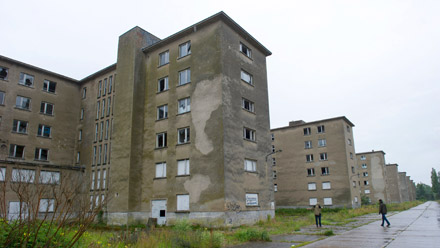Hitler's holiday resort to be turned into luxury flats, hotel and spa
Critics say the redevelopment of Prora, a Nazi seaside 'paradise', affirms Hitler's vision

A free daily email with the biggest news stories of the day – and the best features from TheWeek.com
You are now subscribed
Your newsletter sign-up was successful
The unfinished shell of Hitler's Nazi holiday paradise – the Colossus of Prora – is to be gutted and redeveloped into luxurious beachfront flats, a high-end hotel and a day spa.
The site sits over 2.8 miles of beachfront on the Baltic island of Ruegen and was begun by the Nazi's "Strength Through Joy" leisure organisation, the Daily Mail reports.
The complex was intended to entertain up to 20,000 holidaymakers at a time. Work on the site began before the Second World War, but was abandoned midway through its construction as funds and resources became stretched.
The Week
Escape your echo chamber. Get the facts behind the news, plus analysis from multiple perspectives.

Sign up for The Week's Free Newsletters
From our morning news briefing to a weekly Good News Newsletter, get the best of The Week delivered directly to your inbox.
From our morning news briefing to a weekly Good News Newsletter, get the best of The Week delivered directly to your inbox.
For decades after the war, the incomplete resort sat empty before it was eventually turned into housing and training facilities for East German soldiers. Now developers are attempting to complete the complex, part of which will be named "New Prora". But work on the site has been the subject of intense scrutiny and criticism.
Some critics say that the renovation fulfils the Third Reich’s plan to turn the area into a tourism hub, The Independent reports.
"These are not harmless buildings," Jurgen Rostock, co-founder for the Prora documentation centre says. "The original purpose for Hitler was the construction of [a resort] in preparation for the war to come. This way of dealing with the building trivialises it and affirms the Nazi regime."

Kathrin Lange, one of the site's real estate brokers, is also aware of the controversy around the revival of the former Nazi holiday and leisure project. "Prora is an experiment," she told Die Welt newspaper. "It is something for the risk-tolerant investor."
A free daily email with the biggest news stories of the day – and the best features from TheWeek.com
Some historians argue that there is some merit in preserving the site, particularly as the buildings encapsulate some of the best architectural practices from the era, which brought together Art Deco and classical Roman design. However, as Vocativ notes, many find it impossible to separate the site's architecture from its politics.
"The buildings themselves seem to give life to the Third Reich's mythology about happy workers, clocking in and out for the greater good of the nation. And that will be hard to erase, regardless of how many Germans come to the area for shopping and sun-bathing," Vocativ concludes.
-
 The environmental cost of GLP-1s
The environmental cost of GLP-1sThe explainer Producing the drugs is a dirty process
-
 Greenland’s capital becomes ground zero for the country’s diplomatic straits
Greenland’s capital becomes ground zero for the country’s diplomatic straitsIN THE SPOTLIGHT A flurry of new consular activity in Nuuk shows how important Greenland has become to Europeans’ anxiety about American imperialism
-
 ‘This is something that happens all too often’
‘This is something that happens all too often’Instant Opinion Opinion, comment and editorials of the day
-
 Epstein files topple law CEO, roil UK government
Epstein files topple law CEO, roil UK governmentSpeed Read Peter Mandelson, Britain’s former ambassador to the US, is caught up in the scandal
-
 Iran and US prepare to meet after skirmishes
Iran and US prepare to meet after skirmishesSpeed Read The incident comes amid heightened tensions in the Middle East
-
 Israel retrieves final hostage’s body from Gaza
Israel retrieves final hostage’s body from GazaSpeed Read The 24-year-old police officer was killed during the initial Hamas attack
-
 China’s Xi targets top general in growing purge
China’s Xi targets top general in growing purgeSpeed Read Zhang Youxia is being investigated over ‘grave violations’ of the law
-
 Panama and Canada are negotiating over a crucial copper mine
Panama and Canada are negotiating over a crucial copper mineIn the Spotlight Panama is set to make a final decision on the mine this summer
-
 Why Greenland’s natural resources are nearly impossible to mine
Why Greenland’s natural resources are nearly impossible to mineThe Explainer The country’s natural landscape makes the task extremely difficult
-
 Iran cuts internet as protests escalate
Iran cuts internet as protests escalateSpeed Reada Government buildings across the country have been set on fire
-
 US nabs ‘shadow’ tanker claimed by Russia
US nabs ‘shadow’ tanker claimed by RussiaSpeed Read The ship was one of two vessels seized by the US military